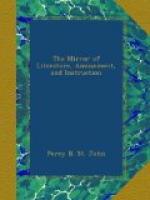Habits of Seals.
The brain of this animal, observes Dr. Harwood, is I think, doubtless, of greater proportionate magnitude than in any other quadruped, and not only does it exhibit in its countenance, the appearance of sagacity, but its intelligence is in reality far greater than in most land quadrupeds: hence its domestication is rendered much easier than that of other animals, and it is susceptible of more powerful attachment. The large seal, which was exhibited some time ago at Exeter ’Change, appeared to me to understand the language of its keeper as perfectly as the most faithful dog. When he entered at one end of its long apartment, it raised its body from the water, in which it was injudiciously too constantly kept, supporting itself erect against the bar of its enclosure, and wherever he moved, keeping its large, dark eyes steadfastly fixed upon him. When desired to make obeisance to visitors, it quickly threw itself on one side, and struck the opposite one several times in quick succession with its fore-foot, producing a loud noise. The young seal, again, which was kept on board the Alexander, in one of the northern expeditions, became so much attached to its new mode of life, that after being thrown into the sea, and it had become tired of swimming at liberty, it regularly returned to the side of the beat, to be retaken on board. Such examples might be greatly multiplied; and I cannot help stating, that aware of this disposition to become familiar, and this participation in the good qualities of the dog, it is astonishing that mankind have not chosen this intellectual and finely organized quadruped, for aquatic services scarcely less important than some of those in which the dog is employed on the surface of the land.—Quarterly Journal.
Gas from Resin.
Mr. Daniel, the meteorologist, has contrived a process for generating gas from resin; which he effects by dissolving the resin in turpentine, or any other essential oil, and then allowing the fluid to drop gradually in a heated cylinder of iron.
Liquorice Paper.
A mode has been discovered in France of fabricating paper solely from the Glycyrrhiza Germanica, or liquorice plant. It is said that this paper is cheap, that it is of a whiteness superior to that generally made, and that size is not requisite in its manufacture.
Tachygraphy.
A mathematical instrument maker at Paris, of the name of Conti, has conceived the notion of a portable instrument which he calls a tachygraph, by means of which any person may write, or rather print, as fast as any other person can speak. M. Conti, however, like many other ingenious men, is not rich; and he has applied to the Academie des Sciences, for pecuniary assistance, and a very favourable report has been made upon his request.




